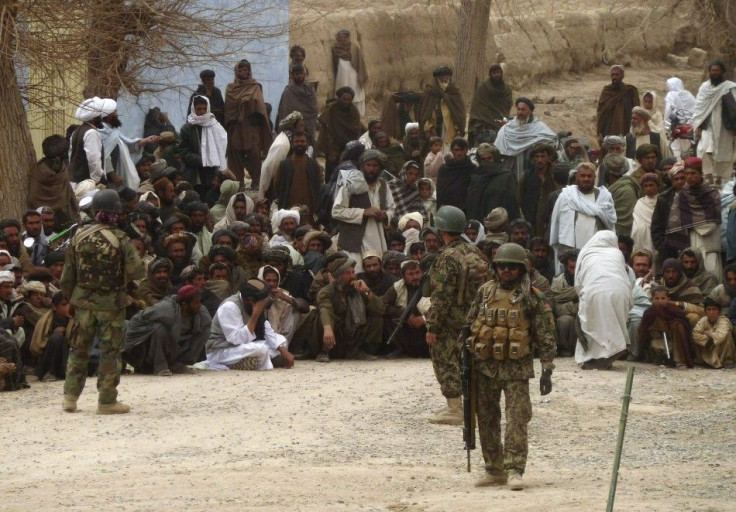US Soldier Slaughters Afghan Civilians Near Kandahar

A U.S. Army sergeant killed at least 16 civilians, nine of them children, in southern Aghanistan before dawn Sunday in the latest outrage to threaten U.S.-Afghan relations, Afghan and American officials said.
Some Afghan government statements and some witnesses said more than one soldier was responsible, but most reports had one lone killer. The U.S. Embassy in Kabul said he was in custody but did not identify him.
U.S. officials said a U.S. Army staff sergeant from a Stryker brigade based in Fort Lewis, Wash., was in custody, The Wall Street Journal reported. An official in Washington told Reuters was married with three children. He had served three tours in Iraq but was on his first deployment in Afghanistan, the official said.
The initial reporting that we have at this time indicates there was one shooter, and we have one man in custody, Lt. Col. Jimmie Cummings, a NATO spokesman, told The New York Times.
The BBC reported that the soldier suffered a breakdown before the attacks and handed himself in to U.S. military authorities after carrying out the killings.
A senior Pentagon rejected witness accounts that several apparently drunk soldiers were involved. Based on the preliminary information we have this account is flatly wrong, the official told Reuters. We believe one U.S. service member acted alone, not a group of U.S. soldiers.
The Times reported that residents of three villages in the Panjwai district of Kandahar Province described a terrifying string of attacks in which the soldier, who had walked more than a mile from his base, tried door after door, eventually breaking into three separate houses. At the first, he piled up 11 bodies, including those of four girls younger than 6, and set fire to them, villagers said.
Witnesses told Reuters, however, that they saw a group of U.S. soldiers arrive at their village around 2 a.m., enter homes and open fire.
A woman in the village of Najeeban told the BBC she had heard gunfire around 2 a.m. A barking dog was shot dead by the gunman, she said.
She added that the Taliban had not been seen in the area for five months.
At least three of the child victims were killed by a single shot to the head, the BBC reported.
An Afghan minister earlier told Reuters that a lone U.S. soldier had killed up to 16 people when he burst into homes in villages near his base in the middle of the night.
Panjwayi district is about 22 miles west of Kandahar city. The district is considered the spiritual home of the Taliban and is believed to be a hive of insurgent activity. The Taliban emailed a statement vowing revenge.
Haji Samad told Reuters 11 of his relatives were killed in one house, including his children. Pictures showed blood-splattered walls where the children were killed.
They (Americans) poured chemicals over their dead bodies and burned them, a weeping Samad said at the scene.
I saw that all 11 of my relatives were killed, including my children and grandchildren, said Samad, who had left the home a day earlier.
Neighbors said they awoke to crackling gunfire from American soldiers, whom they described as laughing and drunk.
They were all drunk and shooting all over the place, said neighbor Agha Lala, who visited one of the homes where the incident took place. Their bodies were riddled with bullets.
The U.S. Embassy said an investigation was under way and the individual or individuals responsible for this act will be identified and brought to justice.
The commander of NATO's International Security Assistance Force, Gen. John Allen, said he was shocked and saddened by the shooting, and promised a rapid investigation. President Barack Obama condemned the crime, and Defense Secretary Leon Panetta called Afghan President Hamid Karzai to express profound regret and assure that this terrible incident does not reflect our shared values or the progress we have made together, the Pentagon said.
Later, Obama also called Karzai to express condolences, the BBC reported.
This incident is tragic and shocking, and does not represent the exceptional character of our military and the respect that the United States has for the people of Afghanistan, the president said, according to the White House.
Afghan lawmakers already are demanding that the shooter be put on public trial in Afghanistan, The Wall Street Journal reports. That is unlikely because the U.S. retains jurisdiction over its military personnel there. Outrage over the Panjway killings, however, is likely to boost Afghan demands to renegotiate American troops' immunity in any future agreement. Soldier immunity was a sticking point in Iraq as well, scuttling plans to leave some American troops there.
The U.S. has already pledged to conduct a joint investigation of the shootings with the Afghans. The suspect was talking to American investigators, but the military said no motive was yet known. Staff sergeants typically command groups of six to eight soldiers.
There were no immediate large protests reported Sunday, but Afghan lawmakers said they expected trouble. This is a terrible act to enter Afghan homes and to kill their children and women. This will have very dangerous consequences, Kandahar parliamentarian Mullah Sayed Mohammed Akhund told the Journal.
Civilian casualties have been a major source of friction between Karzai's Western-backed government and U.S.-led NATO forces in Afghanistan.
The shootings could intensify friction between Washington and Kabul as NATO prepares to hand over all security responsibilities to Afghans by the end of 2014, a process which has already started.
The Koran burning and the violence that followed, including a spate of deadly attacks against U.S. soldiers, tested brittle ties between the governments of Karzai and President Barack Obama and underscored the challenges that the West faces even as it moves to withdraw.
All foreign combat troops will withdraw by end-2014 from a costly war that has become increasingly unpopular.
© Copyright IBTimes 2024. All rights reserved.











